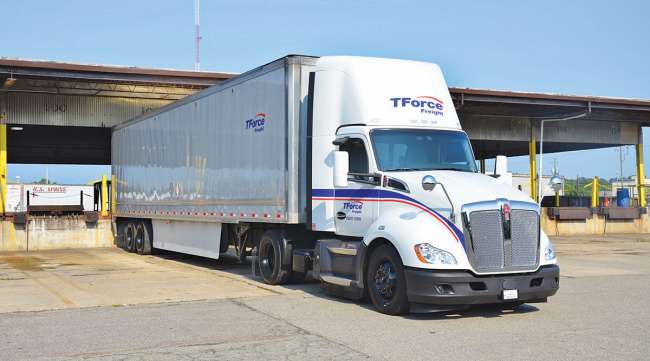TFI made leadership changes at the U.S. LTL business — TForce Freight — midway through the quarter after a difficult January and February. CEO Alain Bédard praised executives Kal Atwal, Chris Traikos and Keith Hall by name. (TForce Freight)
Profit at TFI International fell 39.6% in the first quarter of 2025 due to continued freight market weakness and an industrywide decline in truckload volumes due to Trump administration tariffs.
Bright spots for the carrier came from increased revenue because of the incorporation of Daseke into the company and a turnaround at its U.S. less-than-truckload division precipitated by mid-quarter changes in the management team, CEO Alain Bédard said during an April 24 earnings call.
Montreal-based TFI posted Q1 2025 net income of $56 million, compared with $92.8 million in Q1 2024, the company said after the market closed April 23.
TFI’s overall revenue in Q1 totaled $1.964 billion, up 5% compared with $1.871 billion a year earlier.
The company’s truckload division posted revenue of $662.9 million, compared with $397.7 million in the year-ago period.
Management’s Discussion and Analysis of Operating Results a…
Revenue increased by 61% for the truckload segment due primarily to the acquisition of Daseke, TFI said, while revenue declined by 14% and 13% at its LTL and logistics units, respectively.
The LTL unit posted revenue of $679 million in the most recent quarter, compared with $783.5 million a year earlier.
TFI’s logistics division reported revenue of $384.9 million in the three months that ended March 31, compared with $441.9 million in the same period 12 months earlier.
Still, the company’s specialized truckload unit was hurt by the economic uncertainty and tariffs imposed on steel and aluminum imports by the Trump administration, Bédard said during the call, in addition to existing truckload weakness seen in earlier quarters.
“We’re not using our trucks to the full extent,” the company’s top executive said. TFI’s Canadian TL mileage fell 14.8% to 21,574 miles in Q1 from 25,326 miles a year earlier.
TFI is seeing huge pressure on its flatbed metrics because of underutilization of its rolling stock, Bédard said. “We have way too many trucks and way too many trailers,” he said.
TFI announced the deal to buy Daseke — the No. 1-ranked flatbed carrier in North America — for $1.1 billion in December 2023, bringing on board 4,900 tractors and 11,000 flatbed and specialized trailers.
Excess capacity within TFI’s TL business means the carrier is rowing back capital expenditure. TFI cut its expected 2025 capex to $200 million from $300 million.
The pain for the TL business also means the typically deal-hungry TFI won’t be pursuing many acquisitions in 2025.
Brian Antonellis of Fleet Advantage and TMC General Chairman Radu Mihai discuss the need for targeted training programs for heavy-duty technicians that build a capable, future-ready workforce. Tune in above or by going to RoadSigns.ttnews.com.
“M&A in ’25 is going to be minimal,” Bédard said. “M&A for us in ’25 is buying TFI [stock] because it is a very undervalued asset.” TFI backed away from a Q1 acquisition because of the market uncertainty, he said.
The operating ratio of the truckload unit was 93.7 in the most recent quarter, compared with 89.6 in the same period 12 months earlier, with its specialized TL segment reporting an OR of 94.1, compared with 89.2 in Q1 2024. TFI’s Canadian TL OR was 90.4, compared with 91.2 a year earlier.
Carriers’ OR provides insight on how well a company is balancing its costs and revenue generation. The lower the ratio, the better a company’s performance.
The carrier’s overall OR was 93.7, compared with 90.6 a year earlier. Its LTL division’s OR was 93.1, compared with 89.2 in the year-ago period, with the U.S. LTL OR coming in at 98.9, compared with 92.6 in Q1 2024.
Bédard said the U.S. LTL unit’s performance was disappointing, but he lauded its leadership and staff, a part of the company that often receives a lashing from the executive’s sharp tongue during TFI earnings calls.
Instead, he said: “I feel pretty good with where we are going. The morale has never been so good.”
TFI made leadership changes at the U.S. LTL business — TForce Freight — midway through the quarter after a very difficult January and February, he said, praising executives Kal Atwal, Chris Traikos and Keith Hall by name.
TForce Freight is seeing growth in its small- to medium-size accounts — an area in which it was losing business in the second half of 2024 — and cutting back on larger accounts through which it is losing money, the executive said.
Bédard also expressed confidence in an ongoing revamp of TForce Freight’s information technology systems.
TFI has made and will continue to make several technology changes at the unit. Bédard told analysts changes to the linehaul software were almost finished, and now the unit is beginning work on its pickup and delivery software, starting in Canada. Work on the division’s pricing software should be completed by the end of 2025.
The U.S. LTL business also is moving shipments away from the rails to the road, largely so that mistakes are in its own hands, including missed pickups, he said.
“The biggest issue we have in the U.S. is the rails … because we have no control on rail. If we make a mistake, it is something we can correct. Missed pickups are a disaster,” he said.
“We are improving our service in real terms. Not in fantasy land. That’s going to help our business on churn,” he told analysts.
TFI ranks No. 4 on the Transport Topics Top 100 list of the largest for-hire carriers in North America and No. 8 among both TL and LTL carriers. Also, TFI ranks No. 39 on the TT Top 100 list of the largest logistics companies and No. 43 on TT’s Top 50 list of global freight companies.







